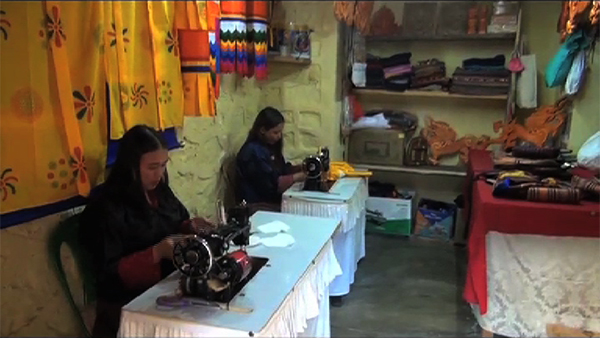 Work keeps people busy and feeling important, making it one of the best tips to improve the quality of life for persons with disabilities. Likewise, for two deaf women, the vocational training they underwent has empowered and reinforced their abilities to live independently even with a disability. Today, they have started their own tailoring business.
Work keeps people busy and feeling important, making it one of the best tips to improve the quality of life for persons with disabilities. Likewise, for two deaf women, the vocational training they underwent has empowered and reinforced their abilities to live independently even with a disability. Today, they have started their own tailoring business.
24-year-old Sanga Choden from Samdrup Jongkhar got her tailoring skills from Draktsho Vocational Training Institute and also worked as an instructor for three years till 2018. And 23-year-old Sonam Choki is a Wangsel Institute graduate. They invested more than Nu 45,000 to start their tailoring shop in March this year in Paro. They have proven that nothing is impossible if one has the determination to take up something and start working on it.
“When I first started the business I thought we would get more customers. Before the COVID-19 situation worsened in the country, people used to visit my shop but the visits declined drastically after the pandemic. I sew cloth bags and now I have started to sew facemasks as well,” shared Sanga Choden.
“For now I will continue to work with my sister-in-law. I will try and learn more about tailoring and then later I will start my own tailoring business,” added Sonam Choki.
The Wangsel Institute introduced vocational studies for the deaf in four major trades such as tailoring, wood carving, carpentry, and traditional painting last year.
“Most of us believe that persons with disabilities are incapable to lead an independent life and we often expect less of them. But that perception is now slowly changing. We can draw inspiration looking at them. We must encourage parents who have children with disabilities to enrol themselves in any kind of training. If given the opportunity, they prove themselves to be competent and proficient,” said Chencho Om, a teacher with the Wangsel Institute for the Deaf in Paro.
Today, of more than a hundred students in the institute, ten of them are pursuing various vocational skills.
NamgayWangchuk









